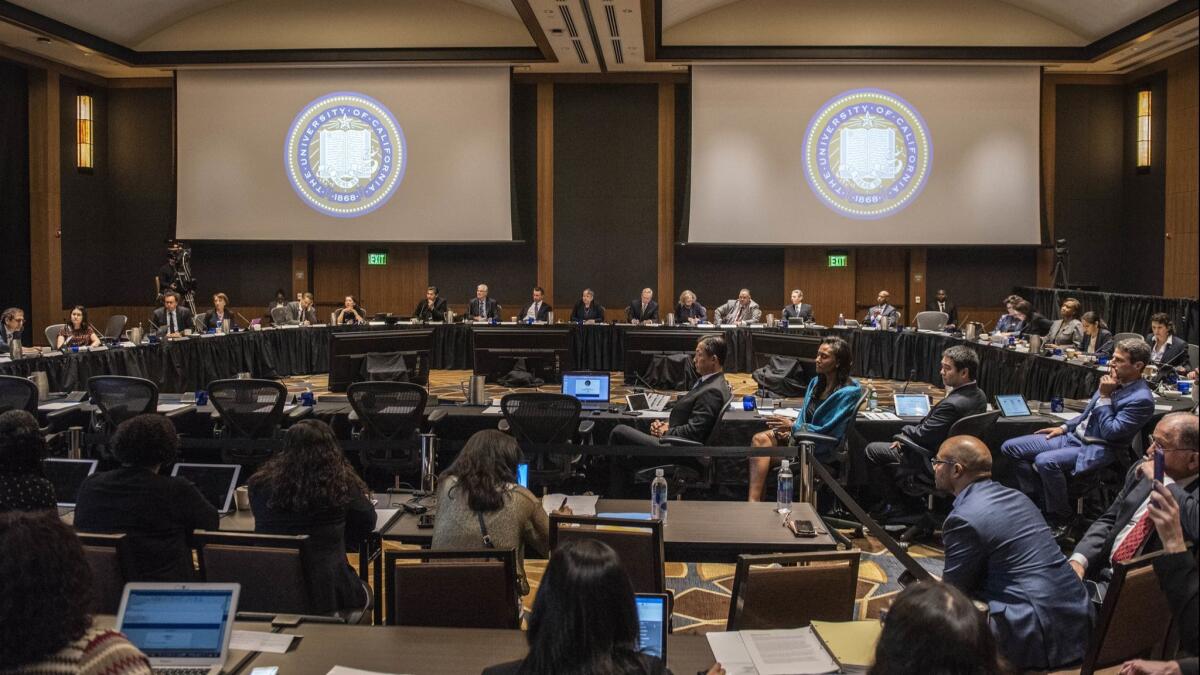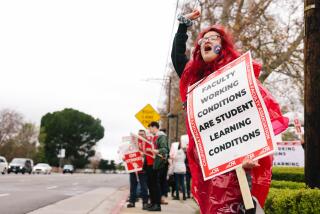UC regents relax rules restricting paid outside jobs for chancellors and top managers

University of California regents voted Thursday to weaken the rules for allowing chancellors and other senior managers to engage in outside professional activities, two years after cracking down on former UC Davis Chancellor Linda Katehi for moonlighting.
UC rules had required pre-approval for all paid and unpaid activities. But before wrapping up a two-day meeting in San Francisco, regents agreed to drop requirements for pre-approval for any outside activity — such as a position on a corporate board — that pays less than $2,500 from a single source in a year, unless required by a higher-up.
But senior managers, a group that includes about 290 people, still will be required to report all outside professional activities, both paid and unpaid.
After Katehi was ousted in 2016 over revelations that she had accepted paid positions with a for-profit education company and a textbook publisher, regents voted to decrease from three to two the number of paid for-profit board seats senior managers can accept. They also created an extra layer of approval for outside activities, as well as an independent review committee to assess any real or perceived conflicts of interest and potential damage to the reputation of a campus or UC.
But chancellors soon complained that the approval process had turned into a bureaucratic nightmare.
UC Berkeley Chancellor Carol Christ said it often took two months to get pre-approvals for her unpaid speeches to the Rotary Club, for instance, or royalties for work editing an anthology of British literature. Another chancellor who wrote an acclaimed book on free speech was told he should have received pre-approval for the project, Christ said.
“I’m sure the policy wasn’t intended to create these incredibly burdensome and bureaucratic reporting requirements,” she said in interview. “Nobody has any problem whatsoever with there being strict scrutiny of service on for-profit boards or for-profit activities.”
Scholarly work will no longer be subject to the UC policy.
Christ called the changes that were approved Thursday “common-sense reforms.”
Other rules, including the limit of holding two paid positions on for-profit boards, remain in place. Exceptions must be approved by regents.
In 2017, four of 10 chancellors reported payments for outside professional activities: Pradeep Khosla at UC San Diego was paid $52,500, Christ at Berkeley received $1,500 and Samuel Hawgood at UC San Francisco got $1,000. UC Davis Chancellor Gary May reported $255,420 in cash and stocks from one corporation and one nonprofit, but much of it was earned in a previous job before joining UC in August 2017.
Board of Regents Chairman George Kieffer said UC’s moonlighting rules remain among the strictest in the nation.
The policy encourages its senior managers to serve on scientific boards, foundations and corporations as a way to share their expertise and learn about other administrative and educational operations.
But regents passed the stricter rules in 2016, after disclosures by the Sacramento Bee that Katehi had taken paid board positions with the DeVry Education Group, which was under federal investigation at the time for fraud, and John Wiley & Sons, a college textbook publisher. The revelations prompted both a state legislative hearing on UC moonlighting and a directive in the state budget to review and adjust policies on outside activities at UC.
Also Thursday, regents voted to phase out the board position of student advisor and instead add other opportunities for students to get involved with decision-making at UC. The position was established two years ago on a pilot basis and had been set to expire in July.
Student advisor Edward Huang pushed to keep the position, saying it would ensure more diversity and amplify student engagement with the Board of Regents. But Student Regent Devon Graves and Caroline Siegel Singh, president of the UC Student Assn., said the advisor position had not worked out as hoped and backed alternative approaches.
In other action, regents discussed a multiyear plan to boost enrollment, improve graduation rates and eliminate achievement gaps among students who are low-income, underrepresented minorities or the first in their families to attend college.
UC campuses are aiming to hit a 90% graduation rate within six years for freshmen and within four years for transfer students by 2030. However, some regents pushed UC officials to try to achieve that rate among all freshmen within four years.
Regents also discussed Gov. Gavin Newsom’s proposed budget, saying they hoped to secure more funding to enroll an additional 2,500 Californians in 2019-20.
Twitter: @TeresaWatanabe
More to Read
Start your day right
Sign up for Essential California for news, features and recommendations from the L.A. Times and beyond in your inbox six days a week.
You may occasionally receive promotional content from the Los Angeles Times.







